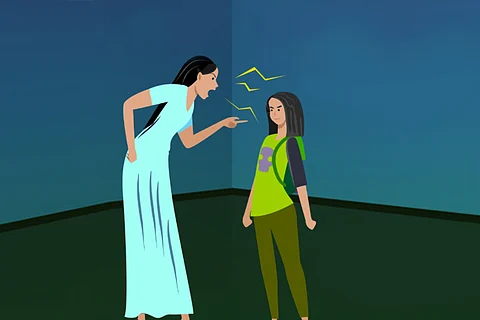

The angry parent shook his head vehemently. He did not understand his transgender child. It was his middle child, assigned male at birth, who insisted on wearing the dresses of the siblings — both of them girls. At school too, the child preferred the company of girls, even as they became teenagers. The parent just could not accept or understand that the child identified with the female gender. All of this came out at a parenting clinic in Kerala, one of the 158 that have been functioning since February this year. When schools remained closed and school counsellors and teachers could not be approached in person, issues faced by children went far too unnoticed. Suicide studies among children gave startling results. That’s when the Department of Woman and Child Development (WCD) decided to start parenting clinics in every block (all 152 of them) and corporation (six).
“Around 4,000 people have already approached these clinics. After the schools closed, suddenly there were no services as such for parents and children to approach, unless they directly went to a psychiatrist or counsellor. So, we set up parenting clinics with school counsellors who were interested in joining the campaign and provided them training in parenting,” says TV Anupama, Director of WCD.
The Department is preparing advanced training modules for the first week of September. It has also set up District Resource Centres (DRC) in all 14 districts; only the Pathanamthitta unit is yet to be functional. The parenting clinics refer certain cases that require an expert panel’s consultation to the DRCs. “Psychiatrists, psychologists, special educators will all be available in this panel. Often, the issues cannot be solved with counselling just the parent or the child. You may need them both to be present. The issues can range from addiction issues of children to clashes between parents and children. The idea is to find the root cause, and if it has to do with any wrong parenting methods,” Anupama says.
Parenting clinic poster
Parents mostly approach the clinics citing issues of children and only identify their own role in the problem later on. “It can be anything from family issues such as an extramarital affair or a divorce to alcoholism of parents. There are cases when both parents have turned out to be alcoholics. Some may create a lot of ruckus at home (in their drunken state), throw and break household items in rage. All of this would affect the child badly,” says Prema, who has been a school counsellor for 12 years, and who is in the team preparing Standard Operating Procedure (SOP) for the parenting campaign.
She talks of gender identity crises that children go through, like in the case mentioned above, and how many parents, despite their education or worldly awareness, fail to accept it. There are cases of children with learning disabilities too, which again many parents fail to recognise. “In all these cases, it is the parents who need counselling. They come with problems such as the child not studying or showing behavioural problems. But even as they talk about it, some parents realise how they might have contributed to the issues,” Prema says.
Unlike school counselling, parenting clinics are not limited to children of school-going age or minors. Prema talks of a case when two young people in their 20s and belonging to different castes got married. “One set of parents was dead against the marriage and even though the couple was happy, forced them into a divorce. In such cases, we refer them to legal officers or else the DRCs.”
Cases come to the parenting clinics mostly through Anganwadi workers. Initially, the clinics opened every Saturday from 9.30 am to 1.30 pm. When the state went into weekend lockdowns, the counselling happened on Fridays. “Now with the Saturday lockdowns lifted, it is again on Saturdays,” says Premjith, UNICEF consultant who provides tech support for the project.
It was last year that Chief Minister Pinarayi Vijayan said in one of his evening press conferences that at least 66 children died by suicide during the COVID-19 lockdown. And that was only a few months into the pandemic.
“We did a survey back then with 72,000 parents participating in it. It's based on that that we decided on a parenting campaign as early as October-November 2020, some of it by spreading awareness through social media. But we couldn’t stop with just that and launched the idea of the clinic. Most parents who come talk about the various addictions the children go through – gaming to alcohol to drugs,” Premjith says.
Watch: Parenting campaign by actors Poornima, Indrajith
The WCD has tied up with the NGO Project Venda of Fourthwave Foundation to train school consellers in beginning a de-addiction module. “Training is happening now and we are equipping all 1,012 school counselors to handle addiction issues. These are usually referred to experts outside school but now they will be able to handle many of the addiction issues within the school unless it is clinical,” says Anupama.
Another programme is the weekly parenting webinars conducted on Saturdays by various psychiatrists and psychologists. The webinar links are posted on the WCD's Facebook page.
The Department is also tying up with the panchayats for an outreach programme so that the counselors at the parenting clinics can reach out to parents in panchayats.